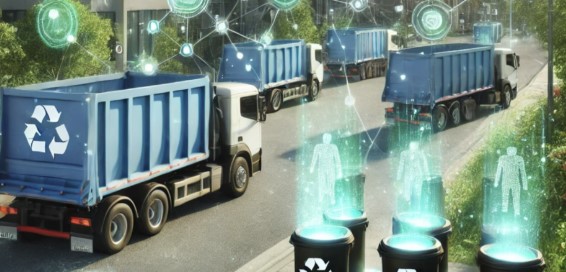Sure! Here’s a detailed blog post on the topic “Internet of Things (IoT) in Waste Management”:
🗑️ Internet of Things (IoT) in Waste Management: Smart Solutions for a Cleaner World
As urban populations surge and environmental concerns grow, the need for efficient, sustainable waste management has become more urgent than ever. Enter the Internet of Things (IoT)—a network of interconnected devices that collect and share data in real time. IoT is revolutionizing various sectors, and waste management is no exception.
In this blog, we’ll explore how IoT is transforming the way cities and organizations handle waste, making processes smarter, faster, and greener.
💡 What Is IoT in Waste Management?
The Internet of Things (IoT) refers to smart devices equipped with sensors, software, and connectivity that gather and transmit data. In waste management, IoT can monitor and manage garbage collection, sorting, recycling, and disposal processes using real-time data.
For example, a smart bin can tell a waste collection truck when it’s full. This might seem simple—but when scaled across a city, it leads to major improvements in efficiency, cost, and sustainability.
🔧 How IoT Works in Waste Management
Here’s a breakdown of how IoT devices are typically used in waste management:
- Smart Bins
- Equipped with ultrasonic sensors to detect fill levels.
- Communicate data to central systems.
- Notify waste collectors when it’s time to empty.
- RFID Tags
- Placed on bins or waste bags.
- Help track waste types and sources.
- Enable monitoring of waste disposal behavior.
- GPS and Route Optimization
- Track garbage trucks in real time.
- Plan the most efficient collection routes based on full bins.
- Save fuel, time, and labor.
- Centralized Dashboards
- Collect data from across the city.
- Allow managers to track collection performance, identify issues, and predict trends.
🌆 Real-World Applications
1. Barcelona, Spain
Barcelona has implemented smart bins that use IoT sensors to monitor waste levels and air quality. Data from these bins helps the city optimize collection schedules and reduce unnecessary truck trips.
2. Songdo, South Korea
The smart city of Songdo uses an underground vacuum waste system connected by sensors. Waste is sucked directly from homes to processing centers—no garbage trucks required!
3. Dublin, Ireland
Dublin uses solar-powered “Bigbelly” bins with fill sensors. The city reduced collection trips by 85% while keeping streets cleaner and lowering emissions.
📈 Benefits of IoT in Waste Management
✅ 1. Efficiency
- Collect only when bins are full.
- Reduce fuel costs and labor time.
- Avoid overflows and missed pickups.
✅ 2. Data-Driven Decision Making
- Monitor waste generation patterns.
- Predict peak times and plan accordingly.
- Improve budgeting and policy planning.
✅ 3. Environmental Impact
- Fewer collection vehicles mean less carbon emission.
- Better recycling and segregation through smart tracking.
- Cleaner streets, less illegal dumping.
✅ 4. Cost Savings
- Prevent unnecessary truck rolls.
- Extend lifespan of infrastructure through better planning.
- Optimize manpower allocation.
⚠️ Challenges to Consider
Despite its promise, IoT in waste management does come with challenges:
- Initial Cost: Sensors, software, and infrastructure upgrades require investment.
- Data Security: With more connected devices comes increased cybersecurity risk.
- Maintenance: IoT devices need regular upkeep and occasional repairs.
- Integration: Existing waste systems may need updates to work with smart tech.
🔮 The Future of Smart Waste Management
The combination of IoT, AI, and machine learning will shape the next era of waste management. Here’s what to expect:
- Predictive Waste Collection using AI to forecast when bins will be full
- Automated Sorting Centers using robotic arms and machine vision
- Smart Incentive Systems for households that manage waste effectively
- Blockchain for Waste Tracking to ensure transparency in recycling and disposal
🧠 Conclusion: Smarter Waste, Smarter Cities
IoT in waste management isn’t just about saving time or money—it’s about building cleaner, more sustainable communities. As smart cities become the norm, waste management systems must evolve too. Whether it’s a solar-powered bin or an AI-driven dashboard, technology offers tools to reduce pollution, conserve resources, and keep cities livable.
Governments, startups, and citizens all have a role to play in making these solutions a reality. The future of waste isn’t trash—it’s tech.
